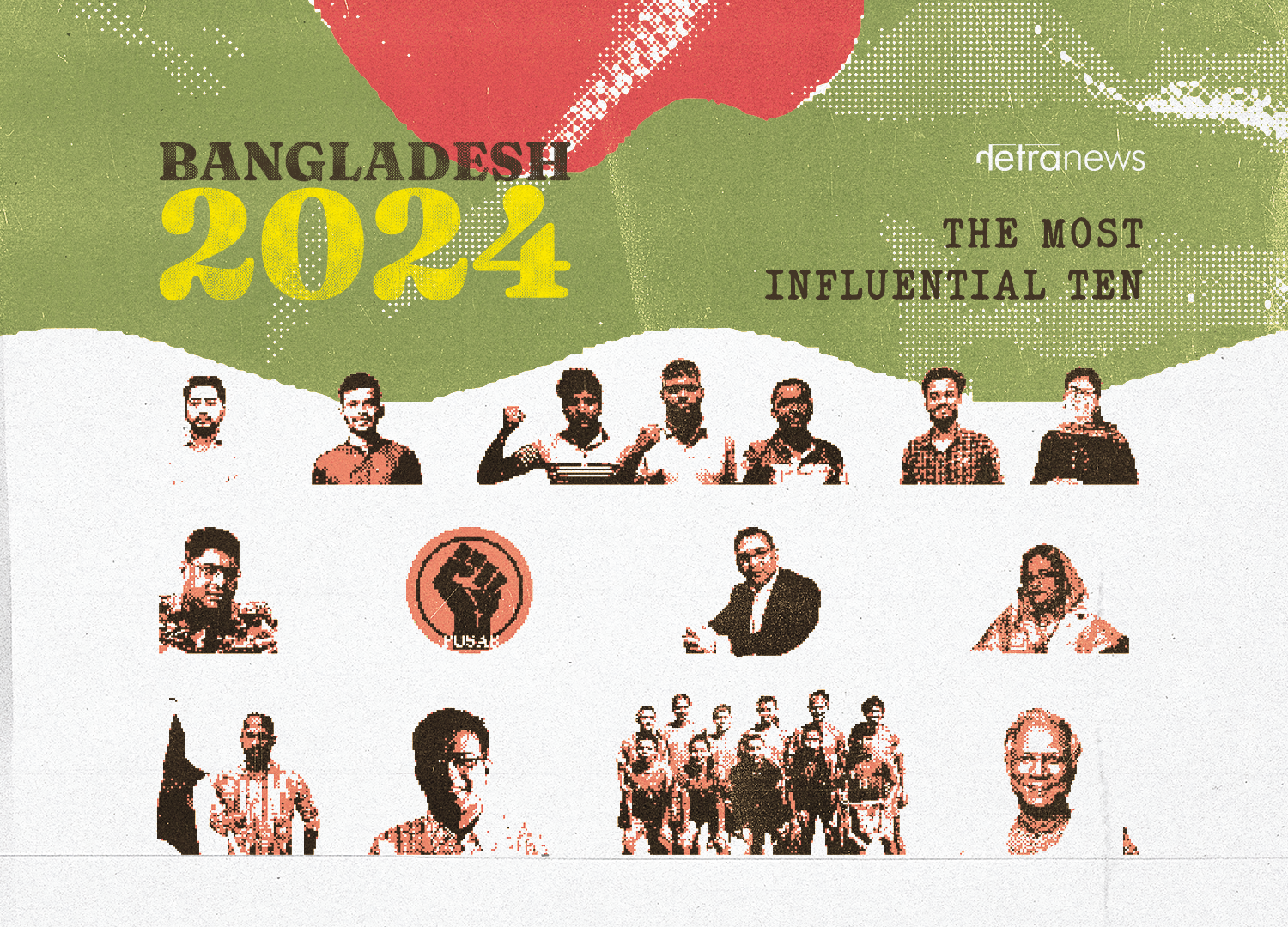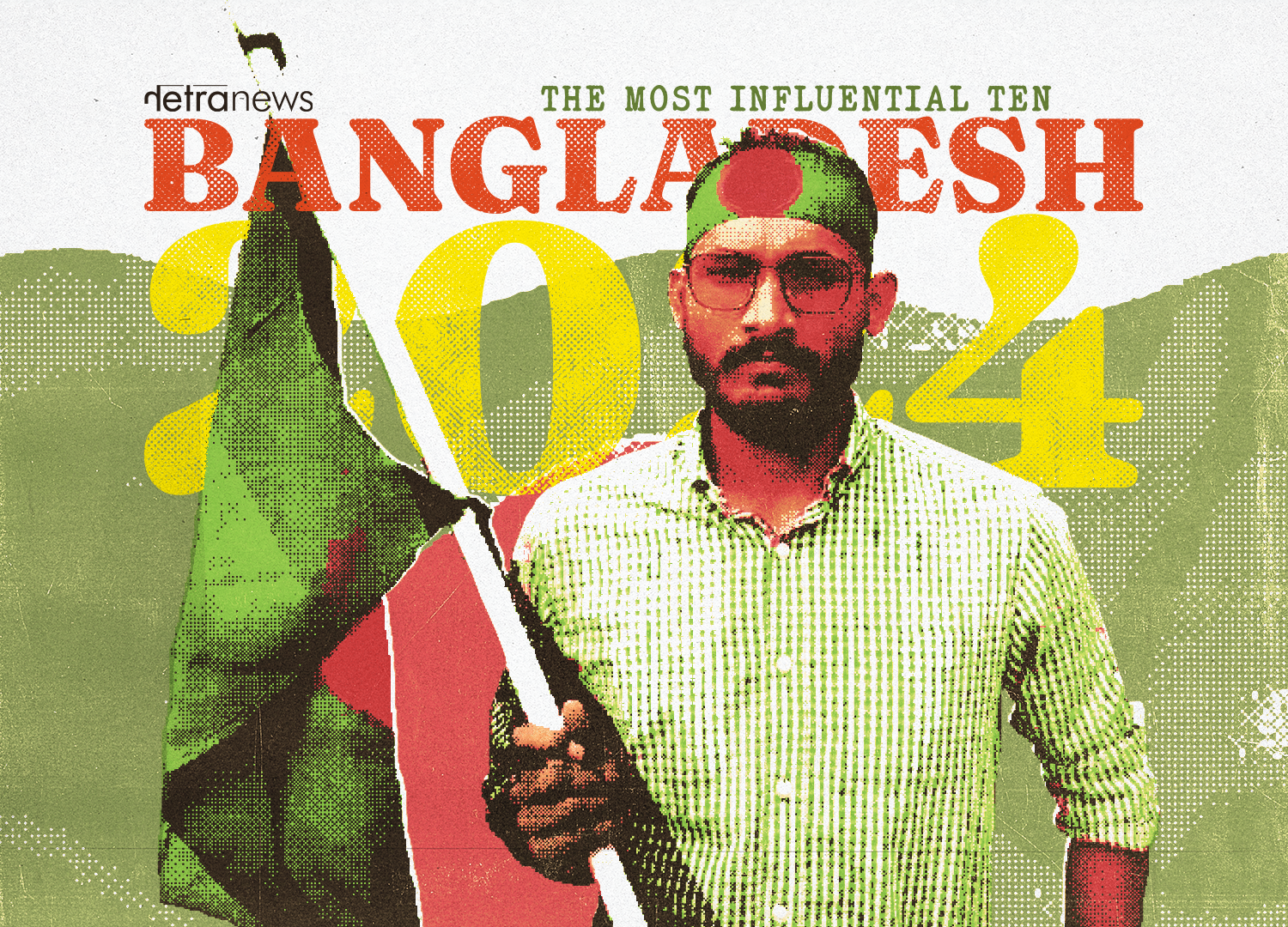Bangladesh in 2024: The most influential ten
A look back at the year through people who influenced it, on Netra News’ fifth birthday.

Netra News is marking its fifth birthday with a list of ten Bangladeshi individuals and groups who have been the most influential in 2024. These are not the best or most important people, nor have they exclusively made positive or productive contributions. For better and worse, 2024 has been an historic year for Bangladesh. These are the people who influenced the way in which the year would play out. As Netra News looks ahead to its first year of being able to operate openly in Bangladesh, here is a look back at the last year through the people who shaped it.
Ten: Sheikh Hasina
On January 7th, Sheikh Hasina had sealed her iron-grip as the supreme leader of a one-party state. She succeeded where Sheikh Mujibur Rahman and other pretenders before her had failed. The authoritarian ruler was going nowhere. That is until July 14th, when her trademark no-nonsense ill-manners at a press conference galvanised the Bangladeshi youth against the Awami League’s autocracy. Over the three weeks that followed, she had command responsibility of the state security forces, and Chhatra League and Jubo League militias as their combined forces conducted a campaign of indiscriminate violence against Bangladeshi citizens that claimed at least 1,500 lives. Despite the Awami League’s best efforts, Hasina’s 15 and a half-year reign ended in ignominy, with her fleeing to India on August 5th.
Nine: Waker-uz-Zaman
At the last moment, Waker-uz-Zaman switched loyalties from the prime minister to the public. This came after the military’s direct involvement in gross human rights violations rampant throughout the Awami League’s rule, including during the summer uprising, wherein military equipment bearing the United Nations insignia was used against unarmed protestors. The United Nations pulled the leash, and the general, at its end, responded by opting to walk the fine line required to keep the Bangladeshi military relevant for future peacekeeping missions. After August 5th, he laudably set the agenda for general elections by being the first to propose a timeline.
Eight: Muhammad Yunus
The Awami League remaining in power guaranteed Muhammad Yunus’ persecution. At the start of the year, his imprisonment was fait accompli. Midway through the year, he had slipped down the order of priorities. He wrested back his relevance when the summer uprising reached its climax. A Yunus undergoing surgery in France — one of the staunchest Western enablers and supporters of the Awami League’s autocracy — would be called upon by the students, to replace the deposed Hasina. It could not be confirmed whether one of Macron and Hasina’s fabled Airbuses was used to transport him to Bangladesh.
Seven: Tarique Rahman
In spite of the rage and concern it can induce, the year draws to a close with Tarique Rahman being Bangladesh’s prime minister in waiting. The Awami League’s misrule has erased from memory the corruption, initiation of the Rapid Action Battalion (RAB), mistreatment of minorities, election manipulation, autocratic tendencies, and all other misdeeds of the last Bangladesh Nationalist Party (BNP) government and Rahman’s shadowy Hawa Bhaban. While the red carpet is being readied for his homecoming, he has been investing time and energy on remotely organising the BNP’s grassroots internally, and projecting a reformed, democratic leader externally.
Six: Bangladesh women’s football team
The rights of women and minorities have regressed over the past decade and a half. Against the backdrop of gross inequalities in a national sporting culture that disproportionately favours cricket, and in pay and recognition compared to men, the women’s football team served a timely reminder about the importance of women and minorities to a post-uprising Bangladesh. Ritu Porna Chakma and Rupna Chakma were the player and goalkeeper of the tournament respectively as Bangladesh celebrated winning the SAFF Women’s Championship on October 30th. As the nation was attempting to heal from the traumatic events of the summer, this triumph was the perfect, unifying balm.
Five: Shafiqul Alam
There were two Shafiqul Alams in 2024, each influential in his own right. The veteran journalist Alam reached a career highpoint few can script: he was one of the quiet, protective, generous heroes of the summer uprising, finding ways to ensure that the truth about what was happening in a disconnected country was being revealed to the world in real-time. After August 5th, he became the press secretary to the chief adviser, rapidly gaining fame and notoriety in equal measure: a political figure who is the public relations face of a lacklustre government, often finding himself being the story.
Four: Commission of Inquiry on Enforced Disappearance
The members of the Commission of Inquiry on Enforced Disappearance are among the bravest people in Bangladesh at present, since the very existence of their work makes them an enemy of the military establishment. In spite of its best efforts, the military has been unable to keep the Commission from implicating it in the worst forms of state terror and human rights violations, alongside fellow perpetrators the Directorate General of Forces Intelligence (DGFI), Rapid Action Battalion (RAB) and the police. Sheikh Hasina has been linked too, highlighting how much the future of the Bangladeshi state is dependent on the success or failure of the Commission. It has the ability to change statecraft for good.
Three: Private University Students Alliance of Bangladesh (Pusab)
An underground group that has been active for a long time as tireless advocates for the rights and inclusion of private university students, Pusab is still largely unknown. Yet, without its remarkable organisational abilities and intervention at a crucial juncture of the summer uprising, Sheikh Hasina would not have fallen. The Pusab-instigated private university students had no stake in the ongoing anti-discrimination quota movement protests when they chose to bleed and die for a greater cause. The continued influence of the activism and long-held investment in democracy of this group bodes well for the future of Bangladesh.
Two: The seminal seven — Nahid Islam, Asif Mahmud, Abdul Hannan Masud, Rifat Rashid, Mahin Sarker, Abdul Kader, Umama Fatima
Nahid Islam’s steely leadership to a leaderless movement as its protests coalesced into an uprising has, hopefully, given birth to a new generation of political leaders. Asif Mahmud remained fiercely loyal to him — a loyalty replicated by Abdul Hannan Masud, Rifat Rashid and Mahin Sarker when they steered the cause and demanded commitment to it at a point where authoritarianism was on the verge of overwhelming the uprising. Abdul Kader showed craft and guile under pressure to produce the nine-point demands. Umama Fatima at once articulated the movement to the world as its spokesperson and demanded that the women protesters had to be recognised for the role they played — one that is being erased in the aftermath.

One: Abu Sayed
The defining image of the Awami League’s still unrepentant autocracy is of a harmless Abu Sayed defiantly baring his chest to the barrels of the state’s guns. The courage and love it takes to face authoritarianism in such a thoroughly disarming, humane, passionate way cannot be comprehended; it can only be marvelled. The cowardice and psychopathy it takes to remorselessly mow him down, to commit to eradicating thousands of vibrant lives without hesitation, to hold the future and humanity of a nation in such utter contempt, must never be comprehended, condoned or copied. Abu Sayed’s needless sacrifice must last into eternity as the symbol of the end of autocracy in Bangladesh.●